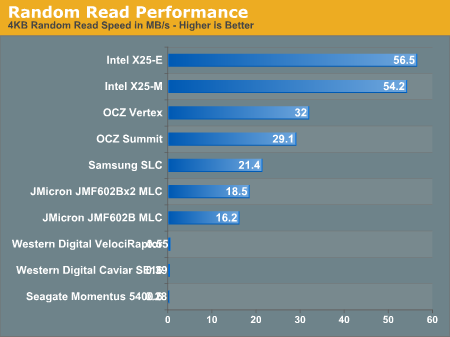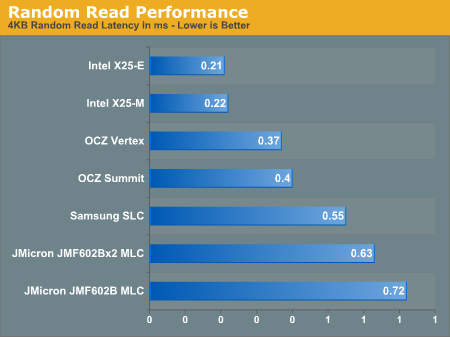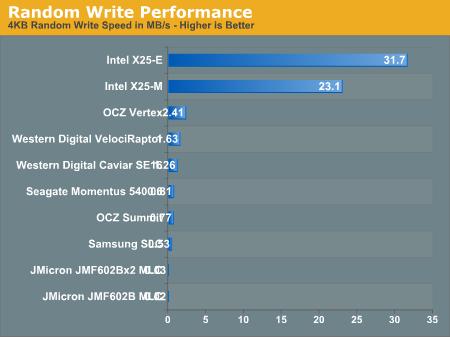The SSD Anthology: Understanding SSDs and New Drives from OCZ
by Anand Lal Shimpi on March 18, 2009 12:00 AM EST- Posted in
- Storage
Random Read/Write Performance
Arguably much more important to any PC user than sequential read/write performance is random access performance. It's not often that you're writing large files sequentially to your disk, but you do encounter tons of small file reads/writes as you use your PC.
To measure random read/write performance I created an iometer script that peppered the drive with random requests, with an IO queue depth of 3 (to add some multitasking spice to the test). The write test was performed over an 8GB range on the drive, while the read test was performed across the whole drive. I ran the test for 3 minutes.

The three hard drives all posted scores below 1MB/s and thus aren't visible on our graph above. This is where SSDs shine and no hard drive, regardless of how many you RAID together, can come close.
The two Intel drives top the charts and maintain a huge lead. The OCZ Vertex actually beats out the more expensive (and unreleased) Summit drive with a respectable 32MB/s transfer rate here. Note that the Vertex is also faster than last year's Samsung SLC drive that everyone was selling for $1000. Even the JMicron drives do just fine here.
If we look at latency instead of transfer rate it helps put things in perspective:

Read latencies for hard drives have always been measured in several ms, but every single SSD here manages to complete random reads in less than 1ms under load.
Random write speed is where we can thin the SSD flock:

Only the Intel drives and to an extent, the OCZ Vertex, post numbers visible on this scale. Let's go to a table to see everything in greater detail:
| 4KB Random Write Speed | |
| Intel X25-E | 31.7 MB/s |
| Intel X25-M | 23.1 MB/s |
| JMicron JMF602B MLC | 0.02 MB/s |
| JMicron JMF602Bx2 MLC | 0.03 MB/s |
| OCZ Summit | 0.77 MB/s |
| OCZ Vertex | 2.41 MB/s |
| Samsung SLC | 0.53 MB/s |
| Seagate Momentus 5400.6 | 0.81 MB/s |
| Western Digital Caviar SE16 | 1.26 MB/s |
| Western Digital VelociRaptor | 1.63 MB/s |
Every single drive other than the Intel X25-E, X25-M and OCZ's Vertex is slower than the 2.5" Seagate Momentus 5400.6 hard drive in this test. The Vertex, thanks to OCZ's tweaks, is now 48% faster than the VelociRaptor.
The Intel drives are of course architected for the type of performance needed on a desktop/notebook and thus they deliver very high random write performance.
Random write performance is merely one corner of the performance world. A drive needs good sequential read, sequential write, random read and random write performance. The fatal mistake is that most vendors ignore random write performance and simply try to post the best sequential read/write speeds; doing so simply produces a drive that's undesirable.
While the Vertex is slower than Intel's X25-M, it's also about half the price per GB. And note that the Vertex is still 48% faster than the VelociRaptor here, and multiple times faster in the other tests.










250 Comments
View All Comments
blackburried - Wednesday, March 25, 2009 - link
It's referred to as "discard" in the kernel functions.It works very well w/ SSD's that support TRIM, like fusion-io's drives.
Iger - Wednesday, March 25, 2009 - link
This is the best review I've read in a very long time.Thank you very much!
BailoutBenny - Tuesday, March 24, 2009 - link
Great in depth article on flash based SSDs. I'm waiting for PRAM though.orclordrh - Tuesday, March 24, 2009 - link
Very illuminating article, very well written and researched. It made me glad that I didn't pull the trigger on an SSD for my I7 machine and regret not buying OCZ memory! I'm interested in adding an SSD as the scratch disk for Photoshop CS4 to use. I don't really launch applications very often, say once a week on the weekly reboot and keep 6-8 apps open at all times. I have 12GB of memory for that. The benchmarks were very interesting, but what sort of activity does Photoshop scratch usage create? Large files or random writes? What type of SSD would be most cost effective here?An SSD does sound better than a SSD!
semo - Wednesday, March 25, 2009 - link
wait for ddr3 to enter the mainstream and buy loads of memory.use a ramdisk for your adobe scratch area. much faster than ssd and no wear to worry about (not that you would worry that much with modern ssds anyway).
http://www.ghacks.net/2007/12/14/use-a-ramdisk-to-...">http://www.ghacks.net/2007/12/14/use-a-ramdisk-to-...
there is also a paid for and more feature rich ramdisk out there. can't remember the name
strikeback03 - Wednesday, March 25, 2009 - link
I'll have to check when I get home, but I believe the recommended size for the scratch disk is upwards of 10GB. So would need a motherboard that supports a LOT of RAM to give enough to main memory plus a scratch disk.strikeback03 - Wednesday, March 25, 2009 - link
I was wondering the same thing. I'd guess it would be a lot of writing/erasing, so an SSD might not be the best from a longevity standpoint, but if your system is hitting the scratch disk often then the speed might make it worthwhile.mikepers - Tuesday, March 24, 2009 - link
Anand,I wanted to compliment you on what I think was an excellent article. This is the type of thing I really have always liked from Anandtech. The detailed background, the technical reasons for the issues and then a thorough review of the current state of things.
I just finished upgrading my desktop. The only remaining item I wanted to replace was the hard disk. I had been thinking about getting a Velociraptor but instead I just ordered a 60GB Vertex from Newegg.
Thanks again for all the work.
Mike P.
ameatypie - Monday, March 23, 2009 - link
That sure was a lot to take in! Fantastic article though, it has really opened my eyes to the possibilities that Solid State Drives provide. Probably wont be buying one in the immediate future given the so-called depression and such things, but i will certainly keep up with SSD progress.Thanks again for your fantastic articles - im sure im not the only one who really appreciates them :)
coopchennick - Monday, March 23, 2009 - link
Hey Anand, I just finished reading through this whole article and I'm very impressed with the thoroughness and how informative it was.You just acquired a new regular reader.